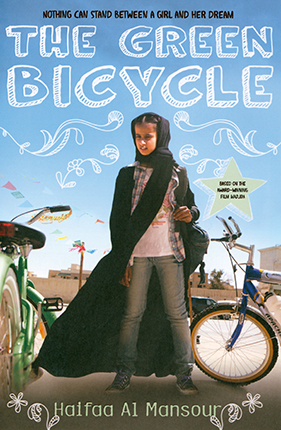| Green bicycle Author: Al-Mansour, Haifaa | ||
| Price: $6.50 | ||
Summary:
Since girls do not ride bikes in Riyadh, Saudi Arabia, eleven year old Wadjda has to scheme to get her own.![]() Download a Teacher's Guide
Download a Teacher's Guide
| Accelerated Reader Information: Interest Level: MG Reading Level: 5.60 Points: 11.0 Quiz: 176441 | Reading Counts Information: Interest Level: 6-8 Reading Level: 5.20 Points: 16.0 Quiz: 67009 | |
Reviews:
Kirkus Reviews (07/15/15)
School Library Journal (08/01/15)
Booklist (09/01/15)
The Bulletin of the Center for Children's Books (00/12/15)
Full Text Reviews:
School Library Journal - 08/01/2015 Gr 4–8—In 2012, Al Mansour directed the film Wadjda and made history by becoming the first female Saudi Arabian filmmaker to shoot a full-length movie; here, she adapts her successful work for a middle grade audience, with mixed results. Hewing close to the original film, Al Mansour tells the story of Wadjda, a rebellious and snarky 11-year-old Saudi Arabian girl. In a society that prizes modesty and piety in women, Wadjda clashes with authority: fiercely independent, she talks back to adults, listens to Western music, and yearns for a green bicycle she sees in a toy store. When her wayward habits land her in trouble yet again, she decides to go in a new direction by taking part in her school's Koran competition—in order to obtain the prize money and purchase the coveted bike. Wadjda is a well-executed character: despite her feisty nature, she's vulnerable and flawed, and her story will resonate with boys and girls alike. However, whereas in Wadjda, striking visual imagery conveyed the girl's desire for freedom, here, Al Mansour relies on often-clunky prose to describe every action, thought, or emotion. The author often pauses to explain the cultural context of various elements of Saudi culture (the significance of the veil, the concept of a second wife), which provides helpful background for readers unfamiliar with the region but feels purposeful and overwritten compared with the far more artful film. VERDICT The original source material wins out here; however, those seeking to introduce students to Saudi Arabian culture should consider this title.—Mahnaz Dar, School Library Journal - Copyright 2015 Publishers Weekly, Library Journal and/or School Library Journal used with permission.
Booklist - 09/01/2015 Wadjda takes pride in the fact that she stands out from the crowd, which is hard to do for an 11-year-old girl in Riyadh, Saudi Arabia. What she really wants is a bike, and she resolves to buy one herself, even if her money-making schemes toe the line of acceptable behavior. Meanwhile, as Wadjda’s father begins planning for a second wife, her mother struggles to accept the looming decrease in financial support. Based on her award-winning film Wadjda, Al Mansour’s debut novel is a revelatory glimpse into a culture unfamiliar to many American readers. While the writing is occasionally clunky, Al Mansour nevertheless has structured her evocative novel brilliantly, subtly but incisively highlighting the frustrating, damaging, and pernicious gender politics that curtail women’s freedom. Wadjda’s rebellions, and even her mother’s, are cheerworthy, and while the novel ends with a promise of a sunny future, it’s chastening to see how risky even small actions can be. Young readers will easily sympathize with Wadjda’s wish for a bike, and they will come away with a deeper understanding of a faraway culture. - Copyright 2015 Booklist.



